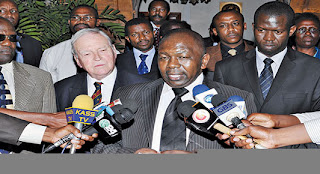In Nairobi: Experts’ word after 8-hour postmortem examination
02:50This is the period the autopsy experts expect to have the full results on tests from specimens extracted from the body.
We took long because we wanted to be thorough, Chief Government s Pathologist Dr Johansen Oduor told journalists at the end of the gruelling wait.
There are many tests that we need to conduct before knowing the possible cause of the death and this may take eight to ten weeks to know, said Oduor. Dr Oduor said the samples would be tested by experts who will reveal the results. He added: All of us, the seven pathologists, are in agreement on the exercise so far. They did not however want to respond to questions from journalists.
The British autopsy expert, Dr Ian Madison Calder, too said he agreed with his colleagues. “I am in agreement with our colleagues and the findings will take a bit longer to be out,” said Dr Calder before they walked away.
Seven pathologists, including a respected British autopsy expert in cases of sudden death, took part in the postmortem examination on the body of the late Makueni Senator.
The autopsy experts yesterday entered the Lee Funeral Home to conduct the exercise expected to unravel the cause of Mutula’s sudden death last Saturday.
However, eight hours later, at 8pm to be precise, non of them had not come out to brief journalists as promised late afternoon by a personal assistant to Machakos Senator, Mr Johnstone Muthama. Muthama witnessed the exercise.
The Senator was in the autopsy room together with the medical representatives of Mutula’s family, Dr Luke Musau of Nairobi Hospital, Dr Emily Rogena, and Dr Calder Ian Madison from the UK.
Media briefing
Dr Calder, his papers showed, has among his areas of expertise, “Forensic medicine in the context of sudden and unexpected death”. The papers also says, “he is a conductor of second autopsies,” meaning cases where the first one is either disputed, disregarded or inconclusive.






0 comments:
Post a Comment